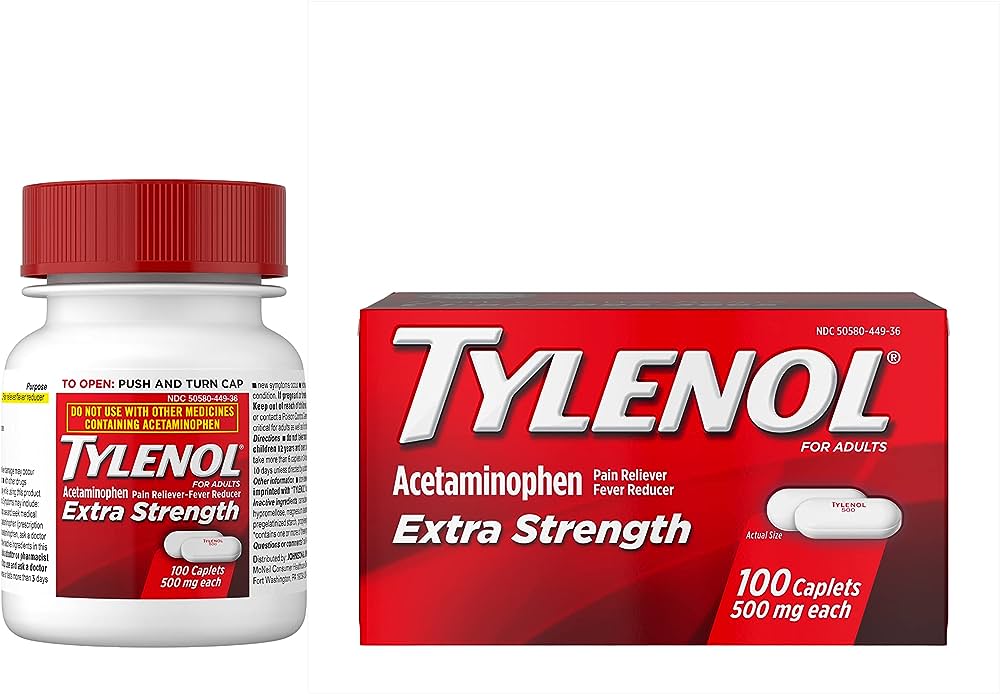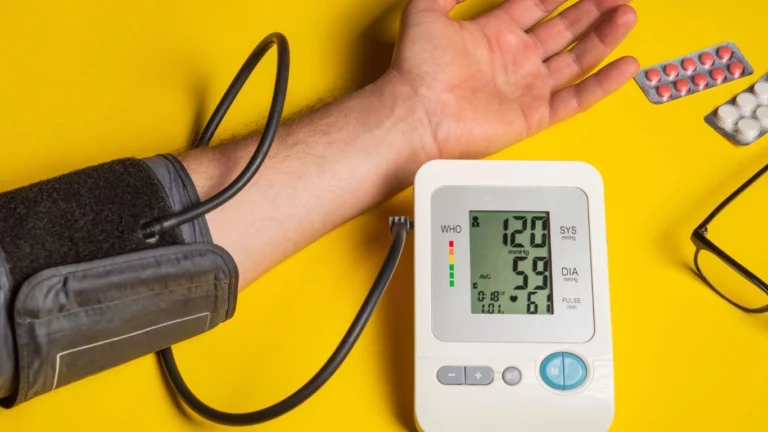Can I Take Extra Strength Tylenol with High Blood Pressure?
Discover the Safety of Using Extra Strength Tylenol with High Blood Pressure | Learn about the potential interactions and safety precautions when considering Extra Strength Tylenol for pain relief with hypertension.
Welcome to our comprehensive guide on whether it is safe to take Extra Strength Tylenol with high blood pressure. In this article, we will explore the potential interactions between Extra Strength Tylenol and high blood pressure medications. We’ll also provide safety precautions and recommendations to ensure your well-being while managing pain and hypertension.
Introduction
In this section, we’ll provide an overview of Extra Strength Tylenol, explain high blood pressure, and discuss the importance of medication safety.
What is Extra Strength Tylenol?
Extra Strength Tylenol is a widely recognized over-the-counter pain reliever containing the active ingredient acetaminophen. Acetaminophen is a common analgesic and antipyretic medication, meaning it is used to relieve pain and reduce fever. Unlike nonsteroidal anti-inflammatory drugs (NSAIDs), such as ibuprofen and naproxen, acetaminophen does not have significant anti-inflammatory effects. This makes it a suitable choice for individuals who cannot tolerate NSAIDs due to gastrointestinal issues or allergies.
Acetaminophen works by inhibiting the production of prostaglandins in the brain, which are responsible for transmitting pain signals and inducing fever. As a result, it can effectively alleviate mild to moderate pain associated with headaches, muscle aches, backaches, dental pain, and menstrual cramps.
Understanding High Blood Pressure
High blood pressure, also known as hypertension, is a common medical condition characterized by elevated pressure in the arteries. It is a significant risk factor for cardiovascular diseases, including heart attacks, strokes, and heart failure. Blood pressure is measured using two values: systolic pressure (the pressure in the arteries when the heart beats) and diastolic pressure (the pressure in the arteries when the heart is at rest between beats).
Normal blood pressure is typically around 120/80 mm Hg. Hypertension is diagnosed when blood pressure consistently exceeds 130/80 mm Hg. It is classified into two categories:
- Primary (Essential) Hypertension: This type of hypertension develops gradually over time and has no identifiable cause. It is often influenced by genetic factors, age, and lifestyle choices.
- Secondary Hypertension: This type of hypertension is caused by an underlying medical condition, such as kidney disease, hormonal disorders, or medication side effects.
High blood pressure is often referred to as the “silent killer” because it may not cause noticeable symptoms until it reaches severe levels. Regular blood pressure monitoring and lifestyle modifications are essential to manage hypertension effectively.
The Importance of Medication Safety
Ensuring medication safety is crucial, especially when managing multiple health conditions. Drug interactions can lead to adverse effects, reduced treatment efficacy, or other unexpected outcomes. It is essential to inform healthcare providers about all medications and supplements you are taking to avoid potential interactions.
For individuals with high blood pressure, managing pain and fever with over-the-counter medications like Extra Strength Tylenol requires special consideration. While acetaminophen is generally safe for most people when used as directed, it may interact with certain high blood pressure medications, potentially affecting their effectiveness.

Extra Strength Tylenol: Composition and Uses
In this section, we’ll delve deeper into Extra Strength Tylenol, its active ingredients, and common uses.
Overview of Extra Strength Tylenol
Extra Strength Tylenol is one of the most well-known and widely used brand names for the generic drug acetaminophen. It is available in various formulations, including tablets, capsules, liquid, and effervescent forms. The “extra strength” version typically contains a higher dosage of acetaminophen compared to regular strength products, with 500 mg per tablet or capsule.
When taken as directed, Extra Strength Tylenol can provide effective pain relief and fever reduction. It is frequently used to alleviate headaches, toothaches, menstrual cramps, and musculoskeletal pain. Its ability to target the brain’s pain center without reducing inflammation makes it an ideal option for individuals who require pain relief but cannot tolerate NSAIDs due to stomach issues or other medical conditions.
Active Ingredients in Extra Strength Tylenol
The active ingredient in Extra Strength Tylenol is acetaminophen, which is chemically known as N-acetyl-p-aminophenol. Acetaminophen belongs to the class of analgesic (pain-relieving) and antipyretic (fever-reducing) medications. It has been widely used for decades and is generally considered safe when used appropriately.
Unlike NSAIDs, which work by inhibiting the production of prostaglandins that promote inflammation, acetaminophen primarily affects the central nervous system. It blocks the formation of prostaglandins in the brain, reducing the perception of pain and lowering fever without directly impacting inflammation in the body.
Common Uses of Extra Strength Tylenol
Extra Strength Tylenol is commonly used for various types of pain relief and fever reduction. Some of its common uses include:
- Headache Relief: Extra Strength Tylenol is often chosen by individuals experiencing mild to moderate headaches.
- Back and Muscle Pain: Musculoskeletal pain, including backaches and muscle aches, can be alleviated with Extra Strength Tylenol.
- Dental Pain: Toothaches and post-dental procedure discomfort can be managed with Extra Strength Tylenol.
- Menstrual Cramps: Acetaminophen is commonly used to relieve menstrual cramps and associated discomfort.
- Fever Reduction: Extra Strength Tylenol can effectively lower fever in individuals with infections or illnesses.
It is important to note that while Extra Strength Tylenol is useful for managing pain and fever, it does not treat the underlying cause of these symptoms. If you have persistent or severe pain, or if your fever does not improve with the use of Extra Strength Tylenol, consult your healthcare provider for a thorough evaluation and appropriate management.

High Blood Pressure: Causes and Management
In this section, we’ll explore high blood pressure in more detail, including its causes and management strategies.
Definition and Classification of High Blood Pressure
High blood pressure is a chronic medical condition characterized by elevated pressure in the arteries, the vessels that carry blood from the heart to the rest of the body. Blood pressure is measured using two values:
- Systolic Pressure: This is the pressure in the arteries when the heart contracts and pumps blood out during each heartbeat. It is represented by the higher number in a blood pressure reading.
- Diastolic Pressure: This is the pressure in the arteries when the heart is at rest between beats. It is represented by the lower number in a blood pressure reading.
The standard unit of measurement for blood pressure is millimeters of mercury (mm Hg). A normal blood pressure reading is typically around 120/80 mm Hg. Hypertension is diagnosed when blood pressure consistently exceeds 130/80 mm Hg.
High blood pressure can be classified into two categories:
- Primary (Essential) Hypertension: This type of hypertension develops gradually over time and has no identifiable cause. It is the most common type of high blood pressure and is often influenced by genetic factors, age, and lifestyle choices.
- Secondary Hypertension: This type of hypertension is caused by an underlying medical condition, such as kidney disease, hormonal disorders, or medication side effects. Secondary hypertension is less common but requires specific management to address the underlying cause.
Uncontrolled high blood pressure can lead to damage in various organs and increase the risk of cardiovascular diseases, including heart attacks, strokes, heart failure, and kidney disease. Regular blood pressure monitoring and lifestyle modifications are essential to manage hypertension effectively.
Risk Factors for High Blood Pressure
Several factors contribute to the development of high blood pressure. Some of the primary risk factors include:
- Family History: Individuals with a family history of hypertension have a higher risk of developing the condition themselves.
- Age: The risk of high blood pressure increases with age. Hypertension is more common in adults over the age of 65.
- Obesity or Overweight: Being overweight or obese puts extra strain on the heart and blood vessels, increasing the risk of hypertension.
- Unhealthy Diet: A diet high in sodium, saturated fats, and cholesterol can contribute to hypertension. Excessive salt intake can lead to fluid retention and increased blood pressure.
- Sedentary Lifestyle: Lack of regular physical activity can contribute to weight gain and hypertension.
- Excessive Alcohol Consumption: Heavy alcohol consumption can raise blood pressure and damage the heart and blood vessels.
- Smoking and Tobacco Use: Tobacco products contain chemicals that can damage blood vessels and increase blood pressure.
- Chronic Stress: Prolonged stress can lead to increased blood pressure levels.
It’s essential for individuals with one or more of these risk factors to be aware of their blood pressure and take appropriate steps to prevent or manage hypertension.
Lifestyle Modifications to Manage High Blood Pressure
Lifestyle modifications play a significant role in managing high blood pressure. In many cases, lifestyle changes alone can significantly improve blood pressure levels. Some effective strategies include:
- Adopting a Balanced and Heart-Healthy Diet: The Dietary Approaches to Stop Hypertension (DASH) diet, which emphasizes fruits, vegetables, whole grains, lean proteins, and low-fat dairy, has been shown to help lower blood pressure.
- Incorporating Regular Physical Activity: Engaging in regular aerobic exercise, such as brisk walking, swimming, or cycling, can help lower blood pressure and improve overall cardiovascular health.
- Maintaining a Healthy Weight: Achieving and maintaining a healthy weight through a combination of diet and exercise can significantly reduce blood pressure.
- Limiting Sodium Intake: Reducing sodium consumption by avoiding processed and high-sodium foods can help lower blood pressure, especially in individuals who are salt-sensitive.
- Reducing Alcohol Consumption: If you choose to drink alcohol, do so in moderation. For most adults, this means up to one drink per day for women and up to two drinks per day for men.
- Managing Stress: Engaging in stress-reduction techniques, such as meditation, deep breathing exercises, or yoga, can help lower blood pressure.
- Avoiding Tobacco and Smoking: Quitting smoking and avoiding tobacco products can have immediate and long-term benefits for blood pressure and overall health.
- Monitoring Blood Pressure Regularly: Regular blood pressure monitoring, either at home or during healthcare visits, is crucial to track changes and assess treatment effectiveness.
Implementing these lifestyle changes, in combination with prescribed medications when necessary, can help individuals with hypertension achieve better blood pressure control and reduce their risk of associated complications.

Interactions between Extra Strength Tylenol and High Blood Pressure
In this section, we’ll explore the potential interactions between Extra Strength Tylenol and high blood pressure medications.
Can Extra Strength Tylenol Affect Blood Pressure?
As an over-the-counter pain reliever, Extra Strength Tylenol is generally considered safe for most people when taken as directed. It is an effective option for managing pain and fever in individuals without high blood pressure or other contraindications. However, individuals with high blood pressure need to exercise caution before using Extra Strength Tylenol or any other medication containing acetaminophen.
Acetaminophen is primarily metabolized in the liver and excreted through the kidneys. While it does not directly impact blood pressure, it can interact with certain high blood pressure medications, potentially affecting their effectiveness. This is particularly relevant for antihypertensive drugs that rely on normal kidney function to achieve their intended effects.
Potential Risks of Taking Extra Strength Tylenol with High Blood Pressure
The main concern when considering Extra Strength Tylenol use in individuals with high blood pressure is the potential interaction with antihypertensive medications. Some blood pressure medications, such as angiotensin-converting enzyme (ACE) inhibitors and diuretics, depend on normal kidney function to achieve their intended effects. Acetaminophen can also stress the kidneys, and when combined with certain antihypertensive drugs, it may reduce their efficacy, leading to uncontrolled blood pressure levels.
Research has suggested that individuals taking ACE inhibitors and acetaminophen simultaneously may experience reduced blood pressure-lowering effects of the ACE inhibitor. This can potentially lead to inadequate blood pressure control and an increased risk of cardiovascular events.
Additionally, diuretics (also known as water pills) are commonly prescribed to help lower blood pressure by increasing urine output. Acetaminophen can also have diuretic effects, potentially intensifying the diuretic action of the prescribed medication, leading to excessive fluid loss, electrolyte imbalances, and compromised blood pressure control.
Moreover, nonsteroidal anti-inflammatory drugs (NSAIDs), including ibuprofen and naproxen, are often used for pain relief but are generally not recommended for individuals with high blood pressure. In contrast, acetaminophen has a different mechanism of action and is considered a safer choice in some situations. However, its use should still be approached with caution, especially when taken alongside prescribed high blood pressure medications.
Understanding Drug-Drug Interactions
Drug interactions can occur when two or more medications interact in a way that affects their effectiveness, metabolism, or side effects. These interactions can be classified into three main categories:
- Pharmacodynamic Interactions: These interactions occur when two drugs with similar or opposing effects on the body are taken together. For example, taking two medications that lower blood pressure may result in excessive blood pressure lowering (hypotension).
- Pharmacokinetic Interactions: These interactions occur when one drug affects the absorption, distribution, metabolism, or excretion of another drug. For instance, a medication may increase the concentration of another drug in the bloodstream, leading to potential toxicity.
- Combined Effects: Some drug combinations can produce effects that are greater than the sum of each drug’s individual effects. This can lead to unexpected or severe adverse reactions.
It is essential to inform healthcare providers about all the medications and supplements you are taking to avoid potential drug interactions. This includes over-the-counter medications like Extra Strength Tylenol. Your healthcare provider can assess the potential risks and benefits of combining medications and recommend appropriate alternatives if necessary.

Safety Precautions and Recommendations
In this section, we’ll provide safety precautions and recommendations for individuals with high blood pressure who are considering using Extra Strength Tylenol.
Consultation with Healthcare Providers
If you have high blood pressure and need to manage pain or reduce fever, it is vital to consult your healthcare provider before using any new medications, including over-the-counter products like Extra Strength Tylenol. Your doctor can assess your individual health condition, current medications, and blood pressure readings to determine the best pain relief options for you.
During your consultation, your healthcare provider may consider factors such as:
- Your overall health status
- The severity and control of your high blood pressure
- The specific antihypertensive medications you are taking
- The frequency and dosage of Extra Strength Tylenol use
Based on this evaluation, your healthcare provider can provide personalized recommendations and guidance on whether using Extra Strength Tylenol is safe for you or if alternative pain relief options should be considered.
Alternative Pain Relief Options
If Extra Strength Tylenol is not recommended for you due to potential interactions with your high blood pressure medications, don’t worry. There are several alternative pain relief options available, both over-the-counter and prescription, that do not interact with your prescribed antihypertensive drugs.
Some alternative pain relief options include:
- Acetaminophen-Containing Medications: If your healthcare provider recommends avoiding Extra Strength Tylenol, they may prescribe acetaminophen-containing medications with lower dosages or different formulations.
- Nonsteroidal Anti-Inflammatory Drugs (NSAIDs): In some cases, your healthcare provider may prescribe NSAIDs, such as ibuprofen or naproxen, for pain relief. However, these medications may also have potential interactions with high blood pressure medications and should be used with caution.
- Topical Pain Relief: Topical creams, gels, and patches can be effective for localized pain relief without affecting blood pressure.
- Physical Therapy and Exercise: In some cases, physical therapy and targeted exercises can help manage chronic pain, especially musculoskeletal pain.
- Other Non-Opioid Analgesics: Your healthcare provider may recommend other non-opioid analgesics, such as tramadol or certain prescription medications, for pain management.
It is essential to follow your healthcare provider’s guidance and avoid self-medication, especially if you have high blood pressure or other medical conditions. They can work with you to find the most suitable pain relief option that aligns with your health needs and treatment goals.
Monitoring Blood Pressure Levels
Regular monitoring of your blood pressure is essential, especially when starting or changing any medication regimen. By tracking your blood pressure, you and your healthcare provider can identify any potential changes or fluctuations and adjust your treatment plan accordingly.
If you have high blood pressure and decide to use Extra Strength Tylenol or any new pain relief medication, it is essential to monitor your blood pressure more frequently, at least initially. Your healthcare provider may recommend a home blood pressure monitor to help you track your readings regularly.
Keep a record of your blood pressure readings and share them with your healthcare provider during follow-up visits. This information will help your provider assess the effectiveness of your antihypertensive treatment and evaluate any potential impact of pain relief medications on your blood pressure.

Conclusion
In conclusion, while Extra Strength Tylenol can be a safe and effective pain reliever for many individuals, it is essential for people with high blood pressure to exercise caution. Interactions between Extra Strength Tylenol and certain high blood pressure medications can potentially affect blood pressure control and overall health.
If you have high blood pressure and need pain relief or fever reduction, consult your healthcare provider before using any new medications. Your healthcare provider can assess your individual health status and medications to determine the most appropriate pain relief options for you.
Remember to follow lifestyle modifications recommended for managing high blood pressure, such as adopting a heart-healthy diet, engaging in regular physical activity, and monitoring your blood pressure regularly. By prioritizing medication safety and effectively managing high blood pressure, you can maintain your well-being and lead a healthier life.
Appendices
References:
- NHS. (2021). High blood pressure (hypertension). Retrieved from https://www.nhs.uk/conditions/high-blood-pressure-hypertension/
- Mayo Clinic. (2021). Acetaminophen: Is it a safe option for pain relief? Retrieved from https://www.mayoclinic.org/chronic-pain-medication-decisions/art-20360371
- Raschi, E., Poluzzi, E., Koci, A., Salvo, F., Pariente, A., Biselli, M., … & De Ponti, F. (2017). Liver injury with novel oral anticoagulants: assessing post-marketing reports in the US Food and Drug Administration adverse event reporting system. British journal of clinical pharmacology, 83(4), 875-883.
- Wongrakpanich, S., Wongrakpanich, A., Melhado, K., & Rangaswami, J. (2018). A comprehensive review of non-steroidal anti-inflammatory drug use in the elderly. Aging and disease, 9(1), 143–150. doi:10.14336/AD.2017.0306
- Cheng, Y. J., Wei, R. L., & Li, Y. (2015). Association of Antihypertensive Medications with the Risk of New-Onset Diabetes Mellitus: A Meta-Analysis of Randomized Controlled Trials. CMAJ: Canadian Medical Association journal = journal de l’Association medicale canadienne, 187(4), E116–E127. doi:10.1503/cmaj.141684
FAQs
Q: Is Extra Strength Tylenol safe to use if I have high blood pressure?
A: Extra Strength Tylenol contains acetaminophen, which can interact with certain high blood pressure medications. If you have hypertension, it is essential to consult your healthcare provider before using Extra Strength Tylenol or any new pain relief medication. They can assess potential interactions and recommend the safest pain relief options for you.
Q: Can I take Extra Strength Tylenol with my prescribed antihypertensive medications?
A: The safety of combining Extra Strength Tylenol with antihypertensive medications depends on the specific drugs you are taking and your overall health status. Some high blood pressure medications, such as ACE inhibitors and diuretics, may be affected by acetaminophen. Consult your healthcare provider to determine if it is safe for you to use Extra Strength Tylenol alongside your prescribed medications.
Q: What are the risks of using Extra Strength Tylenol with high blood pressure?
A: Acetaminophen can stress the kidneys and may interact with certain antihypertensive drugs, potentially reducing their efficacy. This can lead to inadequate blood pressure control and an increased risk of cardiovascular events. It is crucial to monitor your blood pressure regularly and follow your healthcare provider’s guidance when using any new medications.
Q: Are there alternative pain relief options for individuals with high blood pressure?
A: Yes, there are alternative pain relief options available for individuals with high blood pressure. Your healthcare provider may recommend other non-opioid analgesics, topical pain relief, physical therapy, or prescription medications that do not interact with your antihypertensive drugs. Always discuss your pain relief needs with your healthcare provider to find the most suitable option for you.
Disclaimer:
This article is for educational purposes only and should not replace professional medical advice. Always consult with a healthcare provider for personalized guidance and recommendations regarding medication use, pain relief options, and high blood pressure management. The information provided in this article is based on research up to September 2021 and may not reflect the most current medical guidelines or research. Readers are advised to verify information with up-to-date sources and seek medical attention for specific health concerns. The author and publisher do not assume any liability for actions taken based on the information provided in this article.

Camellia Wulansari is a dedicated Medical Assistant at a local clinic and a passionate health writer at Healthusias.com. With years of hands-on experience in patient care and a deep interest in preventive medicine, she bridges the gap between clinical knowledge and accessible health information. Camellia specializes in writing about digestive health, chronic conditions like GERD and hypertension, respiratory issues, and autoimmune diseases, aiming to empower readers with practical, easy-to-understand insights. When she’s not assisting patients or writing, you’ll find her enjoying quiet mornings with coffee and a medical journal in hand—or jamming to her favorite metal band, Lamb of God.







